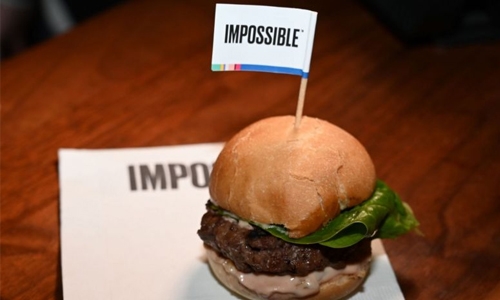Alternative meat seen as potentially juicy business
No longer at the food fringes, plant-based meats are selling well in supermarkets and emerging as a hot commodity for fast food chains, industrial food companies and Wall Street investors. JPMorgan Chase has estimated the market for plantbased meat could easily top $100 billion in 15 years. Barclays says the “alternative meat” market could account for around 10 percent of all global meat sales, or up to $140 billion in 10 years.
Among big restaurant chains, Burger King has been testing since April a vegetarian version of its flagship “Whopper,” while McDonald’s has unveiled a meatless burger in Germany. Kentucky Fried Chicken is studying non-meat options for its menu. The best-known new ventures, Impossible Food and Beyond Meat, have had difficulty at times meeting surging demand for their products, even as Wall Street has bet on their potential.
Impossible Burger, which is already sold in more than 7,000 restaurants in the United States and Asia, recently raised $300 million in a financing round that valued the company at $2 billion.
Enter food giants
Among large food companies, Swiss giant Nestle in April launched its “Incredible Burger” in Europe based on soy, wheat and extracts of beetroot and other plants. In the fall, Nestle plans to offer a pea-based “Sweet Earth” veggie burger in the United States. Anglo -Dutch company Unilever last year bought the Vegetarian Butcher, which has said it aims to become the “largest butcher in the world” with plant-based meat.
US company Kellogg has been present in alternative meat since the 1970s through MorningStar Farms. While the brand has not enjoyed the same outsized gains of late as the newer players, it remains the biggest producer in the United States. Others active in the burgeoning business include Brazilian giant JBS, which is launching a vegetarian burger in its home market, and Tyson Foods, a one-time investor in Beyond Meat that plans its own plantb a s e d product.
Related Posts

